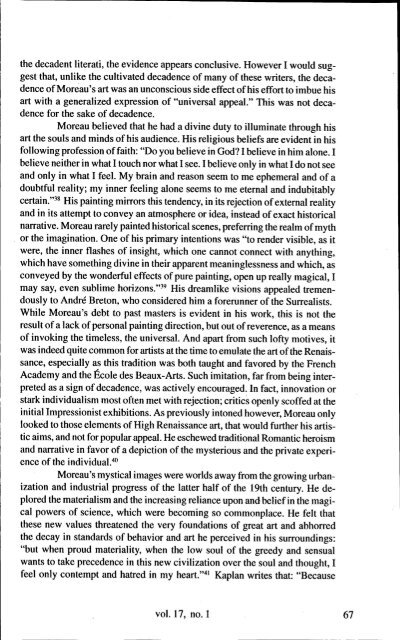Art Criticism - The State University of New York
Art Criticism - The State University of New York
Art Criticism - The State University of New York
You also want an ePaper? Increase the reach of your titles
YUMPU automatically turns print PDFs into web optimized ePapers that Google loves.
the decadent literati, the evidence appears conclusive. However I would suggest<br />
that, unlike the cultivated decadence <strong>of</strong> many <strong>of</strong> these writers, the decadence<br />
<strong>of</strong> Moreau's art was an unconscious side effect <strong>of</strong> his effort to imbue his<br />
art with a generalized expression <strong>of</strong> "universal appeal." This was not decadence<br />
for the sake <strong>of</strong> decadence.<br />
Moreau believed that he had a divine duty to illuminate through his<br />
art the souls and minds <strong>of</strong> his audience. His religious beliefs are evident in his<br />
following pr<strong>of</strong>ession <strong>of</strong> faith: "Do you believe in God? I believe in him alone. I<br />
believe neither in what I touch nor what I see. I believe only in what I do not see<br />
and only in what I feel. My brain and reason seem to me ephemeral and <strong>of</strong> a<br />
doubtful reality; my inner feeling alone seems to me eternal and indubltably<br />
certain."38 His painting mirrors this tendency, in its rejection <strong>of</strong> external reality<br />
and in its attempt to convey an atmosphere or idea, instead <strong>of</strong> exact historical<br />
narrative. Moreau rarely painted historical scenes, preferring the realm <strong>of</strong> myth<br />
. or the imagination. One <strong>of</strong> his primary intentions was "to render visible, as it<br />
were, the inner flashes <strong>of</strong> insight, which one cannot connect with anything,<br />
which have something divine in their apparent meaninglessness and which, as<br />
conveyed by the wonderful effects <strong>of</strong> pure painting, open up really magical, I<br />
may say, even sublime horizons."39 His dreamlike visions appealed tremendously<br />
to Andre Breton, who considered him a forerunner <strong>of</strong> the Surrealists.<br />
While Moreau's debt to past masters is evident in his work, this is not the<br />
result <strong>of</strong> a lack <strong>of</strong> personal painting direction, but out <strong>of</strong> reverence, as a means<br />
<strong>of</strong> invoking the timeless, the universal. And apart from such l<strong>of</strong>ty motives, it<br />
was indeed quite common for artists at the time to emulate the art <strong>of</strong> the Renaissance,<br />
especially as this tradition was both taught and favored by the French<br />
Academy and the Ecole des Beaux-<strong>Art</strong>s. Such imitation, far from being interpreted<br />
as a sign <strong>of</strong> decadence, was actively encouraged. In fact, innovation or<br />
stark individualism most <strong>of</strong>ten met with rejection; critics openly sc<strong>of</strong>fed at the<br />
initial Impressionist exhibitions. As previously intoned however, Moreau only<br />
looked to those elements <strong>of</strong> High Renaissance art, that would further his artistic<br />
aims, and not for popular appeal. He eschewed traditional Romantic heroism<br />
and narrative in favor <strong>of</strong> a depiction <strong>of</strong> the mysterious and the private experience<br />
<strong>of</strong> the individual.40<br />
Moreau's mystical images were worlds away from the growing urbanization<br />
and industrial progress <strong>of</strong> the latter half <strong>of</strong> the 19th century. He deplored<br />
the materialism and the increasing reliance upon and belief in the magical<br />
powers <strong>of</strong> science, which were becoming so commonplace. He felt that<br />
these new values threatened the very foundations <strong>of</strong> great art and abhorred<br />
the decay in standards <strong>of</strong> behavior and art he perceived in his surroundings:<br />
"but when proud materiality, when the low soul <strong>of</strong> the greedy and sensual<br />
wants to take precedence in this new civilization over the soul and thought, I<br />
feel only contempt and hatred in my heart."41 Kaplan writes that: "Because<br />
vol. 17, no. 1 67
















